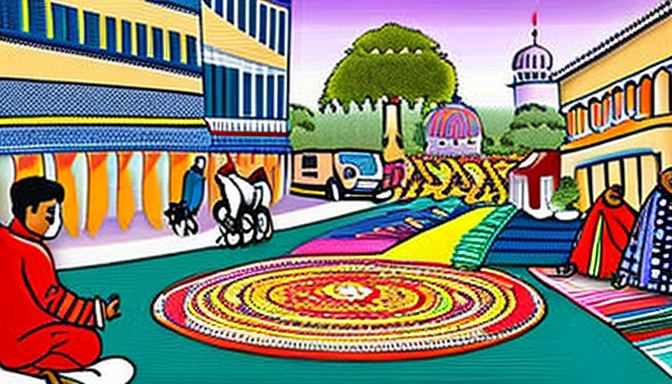Have you ever thought about the stories that swirl around you every day? In Karachi, the air is thick with memories and legacies waiting to be uncovered. This city is not just a bustling metropolis; it’s a living tapestry woven from the threads of countless personal tales. From the vibrant streets of Saddar to the serene shores of Clifton, each corner has a voice that deserves to be heard.
Listening to the stories of those who witnessed Karachi’s past firsthand is like opening a treasure chest. Each narrative offers a glimpse into the lives of people who faced challenges, celebrated victories, and shaped the city we know today. Imagine sitting with an elderly resident, their eyes sparkling as they recount the days when Karachi was a small fishing village. Can you picture the transformation? The hustle and bustle, the cultural exchanges, and the friendships that blossomed? These stories are not just history; they are the very essence of Karachi.
Oral traditions are more than just tales; they are vital links to our past. They help us understand our identity and foster a deep sense of belonging among the diverse communities in Karachi. By capturing these voices, we ensure that the wisdom of the past continues to resonate. We owe it to future generations to keep these stories alive. After all, who knows what hidden gems are waiting to be discovered in the hearts of our elders?
The Power of Oral Traditions
Oral traditions are like bridges connecting us to our past. In Karachi, these stories are not just tales; they are the lifeblood of the city’s rich history. Imagine sitting with an elder, listening to their voice crack as they recount memories of a bustling market or a festival that lit up the streets. These narratives are filled with emotions, laughter, and sometimes tears. They capture the essence of what it means to live in this vibrant city.
Listening to stories from those who witnessed Karachi’s evolution is a powerful experience. Each story is a snapshot of life, revealing the cultural diversity that makes this city unique. From the struggles of early settlers to the celebrations of modern-day Karachiites, these accounts provide a sense of identity and belonging for residents. They remind us of our roots and the shared experiences that bind us together.
Moreover, oral traditions serve as a vital tool for education. They teach us about resilience, community, and the values that have shaped Karachi. By collecting and sharing these stories, we ensure that the voices of the past echo into the future. It’s like planting seeds of knowledge that will grow and flourish for generations to come.
In a world dominated by technology, we must not forget the power of a simple story. So, let’s listen closely. Let’s cherish and share these oral histories. After all, they are the threads that weave the fabric of Karachi’s identity.

Preserving Stories for Future Generations
In a bustling city like Karachi, every street corner has a story. Oral histories are the threads that weave together the rich tapestry of this vibrant metropolis. When we listen to the stories of those who witnessed Karachi’s past, we capture more than just memories; we preserve a legacy that speaks to the heart of its culture. Imagine sitting with an elderly neighbor, hearing tales of their childhood, filled with laughter, struggles, and dreams. These moments are treasures.
But why is it so crucial to document these narratives? Well, they offer invaluable insights into the lives of everyday people. They remind us of our shared humanity. When we record these stories, we create a bridge between generations. Children today can learn about their roots, understanding the challenges and triumphs that shaped their community. This connection fosters a sense of belonging and identity.
Efforts to archive these oral histories are essential. Community projects, local archives, and even digital platforms play a vital role. By collecting and sharing these voices, we ensure that the stories of Karachi are not forgotten. They become part of a larger conversation about who we are and where we come from. In essence, preserving these tales is like planting seeds for future generations to nurture.
So, let’s take a moment to appreciate the power of these stories. They are not just words; they are the heartbeat of Karachi, echoing through time. Let’s listen, document, and share, ensuring these voices are heard for years to come.
Frequently Asked Questions
- What are oral histories?
Oral histories are personal narratives and stories shared by individuals, often capturing their experiences, traditions, and cultural heritage. They provide a unique glimpse into the lives of people and the communities they belong to.
- Why are oral traditions important in Karachi?
In Karachi, oral traditions serve as vital links to the past, preserving the diverse narratives of its communities. They foster a sense of identity and belonging, helping residents connect with their roots amidst the city’s rapid changes.
- How are efforts being made to preserve these stories?
Various organizations and individuals are actively documenting and archiving oral histories through interviews, recordings, and community projects. These efforts ensure that future generations can learn about and appreciate Karachi’s rich cultural heritage.
- Can anyone contribute their story?
Absolutely! Everyone has a story to tell, and contributions from diverse voices are encouraged. Sharing personal experiences helps create a more comprehensive understanding of Karachi’s cultural landscape.
- How can I access these oral histories?
Many oral histories are available through local archives, libraries, and community centers. Additionally, some projects may feature these stories online, making them accessible to a wider audience.